
RuneQuest is a fantasy tabletop role-playing game originally designed by Steve Perrin, Ray Turney, Steve Henderson, and Warren James, and set in Greg Stafford's mythical world of Glorantha. It was first published in 1978 by The Chaosium. Beginning in 1984, publication passed between a number of companies, including Avalon Hill, Mongoose Publishing, and The Design Mechanism, before finally returning to Chaosium in 2016. RuneQuest is notable for its system, designed around percentile dice and an early implementation of skill rules, which became the basis for numerous other games. There have been several editions of the game.
Rolemaster is a fantasy tabletop role-playing game published by Iron Crown Enterprises in 1980. The game system has undergone several revisions and editions since then.
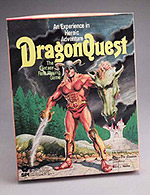
DragonQuest is a fantasy role-playing game originally published by Simulations Publications (SPI) in 1980. Where first generation fantasy role-playing games such as Dungeons & Dragons (D&D) restricted players to particular character classes, DragonQuest was one of the first games to utilize a system that emphasized skills, allowing more individual customization and a wider range of options.
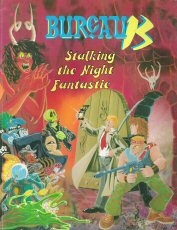
Bureau 13: Stalking the Night Fantastic is a satirical science fiction/horror tabletop role-playing game published by Tri Tac Games in 1992.

Polymancer was a magazine covering roleplaying games and related hobbies such as miniatures, wargaming, and LARPs. The magazine was published in Canada by Polymancer Studios Inc. It was distributed across the United States, across Canada, in the UK, in Australia, and in New Zealand, as well as having hard copies archived with Archives Canada. The first issue was published in 2004 and it ran for 32 issues.

The Legend of the Five Rings Roleplaying Game is a role-playing game originally written by John Wick and published by Alderac Entertainment Group, under license from Five Rings Publishing Group, in 1997. The game uses the Legend of the Five Rings setting, primarily the nation of Rokugan, which is based on feudal Japan with influences from other East Asian cultures.

Masterbook is a generic role-playing game that was published by West End Games (WEG) in 1994.
Sword World RPG is a Japanese tabletop role-playing game created by Group SNE. 10 million copies of the related books including rulebooks, novels and replays have been sold. The game was first published in 1989; the updated edition, known as the "Sword World 2.0", was published in 2008; the current edition "Sword World 2.5" was published in 2018.

Swordbearer is a fantasy role-playing game published by Heritage Games in 1982, and then republished by Fantasy Games Unlimited (FGU) in 1985. The game featured a number of original innovations, but despite good critical reception, it failed to find an audience under either publisher.

Tome of Battle: The Book of Nine Swords is an official supplement for the 3.5 edition of the Dungeons & Dragons role-playing game, published by Wizards of the Coast in 2006. The book chronicles the rise and fall of the fictional Temple of Nine Swords within the D&D universe and introduces an entirely new "initiator" subsystem that gives greater flexibility.
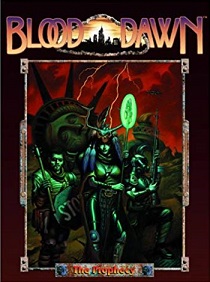
Blood Dawn is a cyberpunk role-playing game designed by Lawrence R. Sims and first published by Optimus Design Systems in 1996.

Bloodlust is a sword and sorcery fantasy role-playing game first released by French publisher Idéojeux in 1991 that allows players to take the role of both a powerful demonic weapon and the hero who wields the weapon.
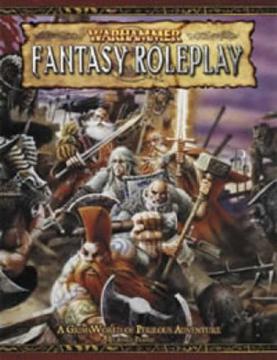
Warhammer Fantasy Roleplay or Warhammer Fantasy Role-Play is a role-playing game set in the Warhammer Fantasy setting, published by Games Workshop or its licensees.

Stormbringer is a fantasy tabletop role-playing game published under license by Chaosium. Based on the Elric of Melniboné books by Michael Moorcock, the game takes its name from Elric's sword, Stormbringer. The rules are based on Chaosium's percentile-dice-based Basic Role-Playing system.

Dragonlance: Fifth Age is an accessory for the SAGA System, published in 1996. It uses the setting of Dragonlance, which originally was used in the Advanced Dungeons & Dragons fantasy role-playing game.

Gatecrasher is a light-hearted science fantasy role-playing game published by Grey Ghost Press in 1996.

Fifth Cycle is a fantasy role-playing game published by Shield Games in 1990.
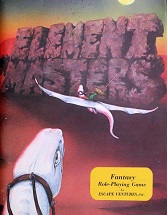
Element Masters is a role-playing game published by Escape Ventures in 1983 that mixes elements of fantasy and science fiction.

GateWar, a fantasy role-playing game published by Escape Ventures in 1994, is the retitled third edition of the role-playing game Element Masters.

Inferno is a fantasy role-playing game published by Death's Edge Games in 1994.


















